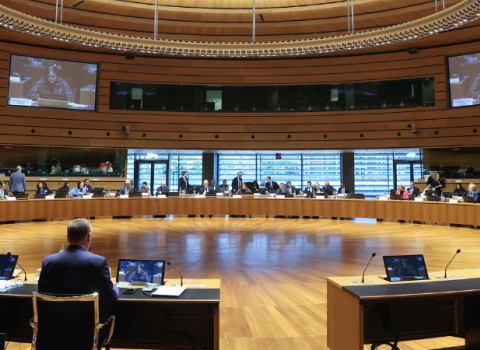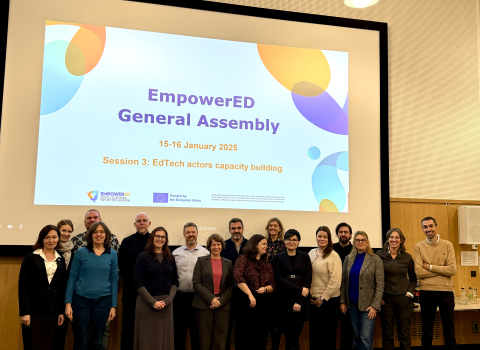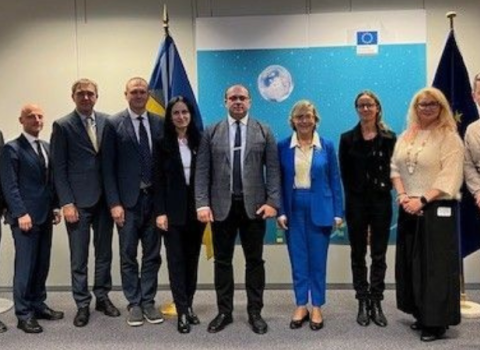The US has finally managed to push through a $60 billion aid package for Ukraine, a vital and timely boost for the country as it continues to fend off Russia’s invasion. While for many in the US and western Europe the war can seem distant, it is very real and its impact stretches far and wide. One example that we look at in this week’s newsletter is cooled interest from foreign investors in Latvia’s market as businesses opt for caution in uncertain times. On the ground in Ukraine, we look at why the country needs big companies, not just start-ups, to support its resilient innovation ecosystem. Finally, we get Poland’s view on the war in a wide-ranging, two-part interview with ministers from the country’s newly re-established Ministry of Science and Higher Education.

The latest news
DON’T FORGET ABOUT RIGA: Major investors in Latvia have scored its investment climate at its lowest level in a decade. War, they say, makes business uncertain. But those on the ground in Latvia say this cooled interest masks what is gradually becoming an interesting hub for innovation, if only it can shrug off unwanted comparisons with its more developed Baltic neighbours. Read our full story here.
UKRAINE NEEDS BIG BUSINESS: The EU needs to incentivise big businesses to open up in Ukraine to spur the economy and the innovation ecosystem, according to tech investor and businessman Sacha Michaud. Speaking at the European Parliament, he said many entrepreneurs don’t know it remains possible to expand businesses in Ukraine. At the same event, MEP Dragoș Tudorache lauded Ukraine’s dynamic technology scene, saying the EU should learn from it. More here.
WHAT’S UP, POLAND? We check in with Poland’s newly re-established Ministry of Science and Higher Education to find out what the country thinks about funding dual-use technologies, its performance in Horizon Europe, how FP10 should look and what it plans to do with a huge chunk of recently unlocked EU funds. Read part one on the international aspects here, and part two on domestic affairs here.
HAVE SOMETHING TO SAY? We welcome opinion pieces and other contributions on R&I policy in central and eastern Europe. Send yours to [email protected].
In other news
THREE WIDENING CALLS CLOSE: Three calls under Horizon Europe’s Widening measures recently closed, with 397 applications amounting to a total requested budget of over €1.9 billion. The three calls were for Excellence hubs, ERA Chairs and Teaming 2nd stage. The results of the evaluation will be published in September this year. See here for more information.
EXTRA FUNDING FOR WIDENING CALLS: An update to Horizon Europe’s work programmes provides extra funding for two Widening calls, one under the Teaming for Excellence scheme and one under ERA Fellowships, to ensure their funding until the next work programmes are adopted in early 2025. More information here.
WIDENING CALLS WEBINAR: Watch here a webinar on new calls under the WIDERA work programmes 2023 - 2025 produced by the European Commission.
€10M TOP-UP FOR MSCA4UKRAINE: The European Commission has topped up the budget of the MSCA4Ukraine initiative, funded under the Marie Skłodowska-Curie Actions, by €10 million. The scheme provides support for organisations hosting Ukrainian researchers for between eight months to two years and was first launched in September 2022 with an initial budget of €25 million. The next MSCA4Ukraine call will open in May 2024.
BULGARIA TARGETS INNOVATION LEADERSHIP: The goal of turning Bulgaria into an innovation and technology leader in southeast Europe has been included in the country’s Foreign Policy Strategy 2024-2030. In related news, Rosen Karadimov has taken over as the country’s minister of Innovation and Growth following the collapse of the coalition government. He replaces Milena Stoycheva, who in an interview last month told Science|Business about her aim to make Bulgaria a regional innovation leader.
LASER CONSORTIUM PROJECT CLOSES: A European project designed to support the management of a high-powered laser institute operating out of three facilities in Czechia, Hungary and Romania has come to a close. The IMPULSE project, which began in November 2020, helped unify operations at the ELI ERIC facility, which had a bumpy road with construction complications at the Romanian institute leading to legal trouble and several delays. IMPULSE had a budget of €20 million and brought together 15 partners from nine countries. ELI has just opened its fourth user call for scientists to access equipment based at its Hungarian and Czech facilities. The Romania facility is on the road to becoming a full consortium partner.
BABEȘ-BOLYAI AND WARWICK UNITE: Babeș-Bolyai University, a Romanian university based in Cluj-Napoca, has signed a strategic cooperation agreement with Warwick University in the UK. The partnership allows for the organisation of joint study programmes and collaboration in various fields of research and development. The two institutes will also focus particularly on innovation in the technology and biomedical areas.
CZECHIA GETS ITS RESEARCH ACT TOGETHER: The Academic Assembly of the Academy of Sciences of the Czech Republic has called for more funding for the country’s research institutions, saying otherwise “we cannot expect miracles”. At an April meeting that brought together scientists, academics and members of the government, the assembly discussed the latest draft of a new government act on research, development, innovation and transfer of knowledge and technology. Eva Zažímalová, president of the Czech Academy of Sciences, welcomed the act’s ambition and said she was pleased the government had taken into consideration “around half” of the body’s comments and recommendations on the act. But there are still concerns about some areas of the act that could lead to the limitation of scientific autonomy and an increase in administrative burden. Minister for Science, Research and Innovation Helena Langšádlová replied that since the amendment is coming 22 years after the law was first created, debate about the act’s contents were natural. She expects an agreement to be reached soon.
20 YEARS OF EU: May 1 will mark 20 years since 10 countries joined the EU – see the full list here – the largest single enlargement of the EU. Among them was the Czech Republic. To mark the occasion, the country’s oldest university, Charles University, held an event bringing together former prime ministers and current government officials. European affairs minister Martin Dvořák used the occasion to talk up the benefits of association on the country’s research cooperations. “Through initiatives such as Erasmus, Erasmus+ and Horizon Europe, Czech students and professionals have been offered new opportunities to exchange ideas with their counterparts across the continent. These interactions have enriched relationships not only at our universities but have also contributed to a sense of European identity,” he said. The European Parliament is also marking the 20th anniversary in a special sitting today.
US LAUNCHES NEW UKRAINE FUND: The US National Academy of Sciences has established a new Science and Innovation Fund for Ukraine with an initial $8 million of support from various philanthropic organisations. The goal is to raise at least $15 million in the next three years. This will go towards developing Ukrainian talent, using research and technology to boost the country’s economy and linking Ukraine’s science and tech community to international companies. It will also provide immediate support for Ukrainian scientists working inside and outside the country.
POLAND - FIND YOUR HORIZON PARTNER: The Polish Science Contact Agency has launched its “searchable brochure” to help researchers and entrepreneurs find partners for Horizon Europe projects. Find out more here.
EIT-ALBANIA PARTNER ON RAW MATERIALS: EIT RawMaterials, Europe’s largest raw materials partnership, has signed an agreement with the Albanian government to establish a regional innovation centre. The new centre will support innovation, education and business creation in the raw material sector. This is the first partnership of its kind between EIT RawMaterials and a western Balkan government. Find out more here.
ERIC NODES FOR WIDENING COUNTRIES: First of all, a few clarifications. It used to be very complex in Europe to build large research infrastructures with tens of countries joining as members. The old model was to create an international organisation – think CERN. But this is tricky to set up due to all sorts of regulatory hurdles. Eventually, the EU created ERIC, essentially a legal status that allows multi-country and cross-border research infrastructures to be set up easily and operate in several states. There are now 28 of these ERICs, represented by the ERIC Forum. Some ERICs are single-site facilities, some are digital and distributed, meaning they draw on data from several sites or have small secondary bases that serve the central hub. These secondary bases are known as nodes. The ERIC Forum says these nodes, when based in central and eastern European countries, are highly beneficial in boosting the local innovation ecosystem. In an as yet unpublished position paper on the next framework programme, FP10, the ERIC Forum says the EU needs to make it easier to combine structural funds with more calls in the Widening instrument to develop these national nodes. More broadly, the ERIC Forum says the Commission needs to increase direct funding to the ERICs to support operational costs.
Mark your calendars
TALLINN, 15-16 MAY: Universities, innovators and investors in the Baltics, along with representatives of the EIT will gather in the capital of Estonia to discuss the role of higher education in deep tech innovation ecosystems. More details here.
RIGA, 16-17 MAY: The Deep Tech Atelier: The Baltics’ largest deep tech industry event aims to bring together entrepreneurs, scientists and technology developers, investors, government, and public organisations. Register here.
VIENNA, 4 JUNE: Startups, investors and corporations will connect, share innovative ideas and start collaborations at the Connect Day 24. The Slovak Business Agency has more details here.
PRAGUE, 13 JUNE: European Research Council president Maria Leptin is to visit Prague where she will give a speech at the “ERC Scientific Mini-conference”. More information here.
KYIV, 18 JUNE: Founders, investors and public institutions will gather in the capital city of Ukraine to talk about uplifting the tech ecosystem in the war-torn country. Read more about PowerUp Ukraine here.
The Widening newsletter is a roundup of news and analysis of research and innovation policy and investments in central and eastern Europe, delivered to your inbox twice a month. Sign up here.





 A unique international forum for public research organisations and companies to connect their external engagement with strategic interests around their R&D system.
A unique international forum for public research organisations and companies to connect their external engagement with strategic interests around their R&D system.